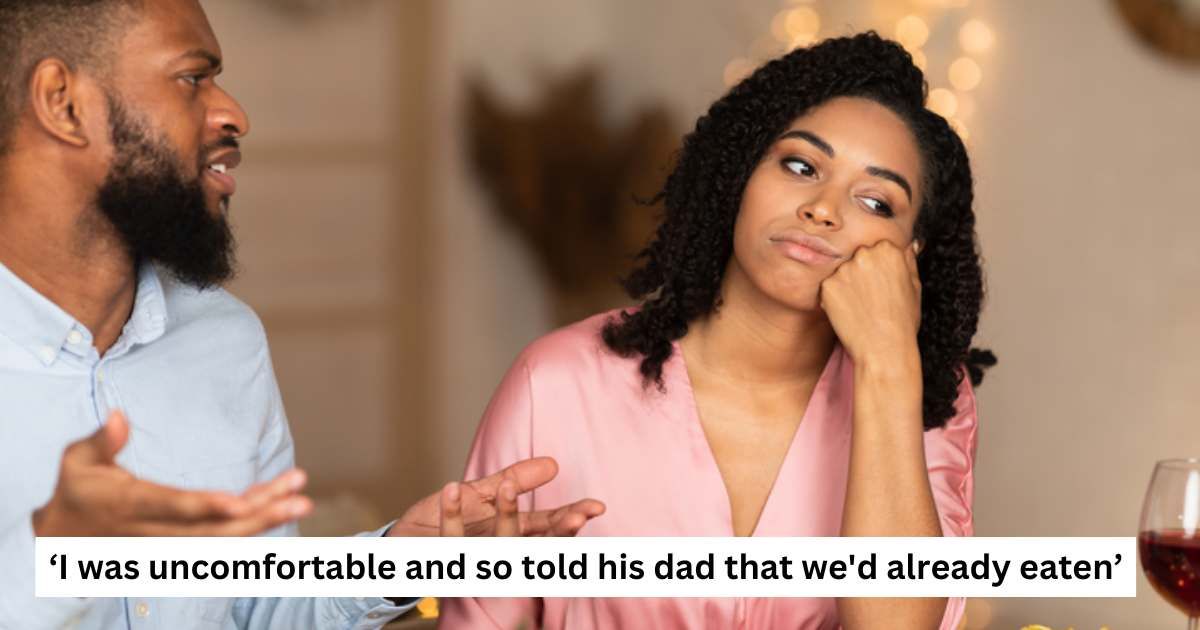AITA: Woman causes family drama as she refuses to eat food made by her father-in-law

When one thinks of Greek dinners, one can imagine rich conversations over delicious dishes, maybe a hearty "Opa!" or two, and plenty of wine to go around.
But for one newlywed woman, a simple family dinner turned into an unexpected tangle of emotions, misunderstandings, and filo pastry, as described in the story, shared by the original poster (OP) on Reddit's Am I the A**hole (AITA) forum.

How Spanakopita became the focus of a tense father-son reunion
Nikolas had always had a complicated relationship with his father. Growing up in the UK, he was born to a Greek father and an English mother who had divorced long ago.
When his father moved back to Greece, the physical and emotional distance between them became more pronounced.
But every so often, when his father returned to the UK, they made an effort to reconnect over dinner—a tradition that, while well-meaning, often felt more obligatory than heartfelt.
This time, the invitation was extended not just to Nikolas but also to his 26-year-old wife, whom his father had met only a couple of times before.
“He didn't specify that we were going to eat anything, just said we could have a few drinks and chat,” she later recounted.
A casual gathering, she thought. No harm in tagging along - it might even offer some moral support for her husband if things went south.
"I've only met him once or twice before now, and I didn't see any reason not to do so and figured that it would be some good backup for Niko if he wanted to leave early or anything. So we went around yesterday at around 9pm."
At 9 pm, they arrived at his father’s rented apartment, greeted by the warm, buttery aroma of freshly baked spanakopita.
For the uninitiated, spanakopita is no ordinary pie. It’s a Greek masterpiece made of flaky filo pastry stuffed with spinach and feta. The sight of it glistening on the table could make even the most disciplined dieter pause.
The father-in-law beamed with pride as he welcomed them in and gestured toward his creation. "Please, have some!" he said enthusiastically, clearly anticipating an enthusiastic response.
But things were about to get awkward.
Pie meets panic at family dinner
For most, refusing a dish might simply be a matter of taste. But for her, food was a much more complex terrain. "For context,” she explained, “I have a history of anorexia, and eating in front of people I don’t really know is still an issue for me. Pastry, in particular, is something I avoid.”
Her stomach churned—not from hunger, but from anxiety. Explaining her struggles felt too personal and vulnerable for this setting. So, she politely declined.
Her husband, sensing her discomfort, stepped in with a quick save, "but his dad kept insisting that we should try it."
But Nikolas’s father wasn’t one to be deterred. He leaned in, offering the dish again, his tone more insistent this time.
"At us saying no again, he got very up in arms about how he'd gone to the effort of making the food, and that it shouldn't be such an issue for us to just have some of it, and that he felt as though we were disrespecting him by refusing to eat the food."
The great Spanakopita standoff
What had begun as a well-meaning visit quickly spiraled into a cultural clash and a battle of wills.
In many Mediterranean cultures, food isn’t just nourishment—it’s an offering of love, a gesture of respect, and sometimes, a metric for familial loyalty.
To Nikolas’ father, their refusal wasn’t about dietary preferences or personal struggles—it was personal.
Sensing no resolution in sight, the couple tried to salvage the evening. “So husband and I apologised, offered to stay for drinks, but ultimately left as he remained angry about the situation,” she shared.
As they walked out, she couldn’t help but replay the encounter in her mind.

Could she have just taken a small bite to appease him? Would explaining her food anxieties have made things better—or worse?
“I know I could have explained why I didn't want to eat it, but I felt uncomfortable trauma dumping on him about the real reason why, or I could have tried a little bit and then just left it and he probably would have been fine. AITA?
Internet weighs in on woman's Spanakopita plight
The internet had a lot to say about the Spanakopita Standoff—and as expected, opinions were as layered as the filo pastry itself. From understanding voices to cultural defenders, here’s how social media reacted to the awkward dinner.
A large chunk of the internet rallied behind the wife, empathizing with her discomfort and applauding her for setting boundaries.
One reader offered a deeper take, "NAH. Surely this isn't the first time you've run into an overzealous family member trying to get you to eat. Why don't you have a standard response? "It smells/looks amazing but I have a medical issue and don't want to risk it." "We just ate and I'm really full. Can we take some for later?"

"NTA he should have stopped pestering you when you said no, but you really need more therapy about your eating disorder IMO," rallied another user.

One person wrote, “A Greek father. I can imagine how much he wanted you to eat, bc some old school parents believe food=love. NTA. But I wonder if it would be helpful to come up with a response in these situations that makes it clear it’s not the host but doesn’t invite further questions. “I wish I could eat the food, but I have a medical issue that doesn’t allow me too. It’s something I don’t care to discuss.” I’m just throwing something out there; I’m not saying you should say these exact words. Also - I hate spanakopita. So you’re not alone my friend!”

One user wrote, "NAH. I know this is a medical issue for you, but this is a cultural thing with Greeks, food is how we show our love, so this would be considered very rude, especially without a reason. Saying you have a health probably would have been an easy way out. I would also say, as someone who has a history of anorexia and is currently an ED therapist, you should go back to therapy to work on this, because it sounds like you don't have a history, you're still really engaged with your behaviors."

Another person wrote, “NTA and your husband should have warned you how his dad (Greek culture) is with food, because the “try some or I’ll be offended” thing is not uncommon, especially with homemade traditional dishes.”

"NTA, but hope you are seeking the care of a medical professional who specializes in eating disorders," another Reddit user noted.

"OP- you're NTA, but in some instances, a little personal discomfort can smooth the waters long-term," another person said.

This article contains remarks made on the Internet by individual people and organizations. MEAWW cannot confirm them independently and does not support claims or opinions being made online.










